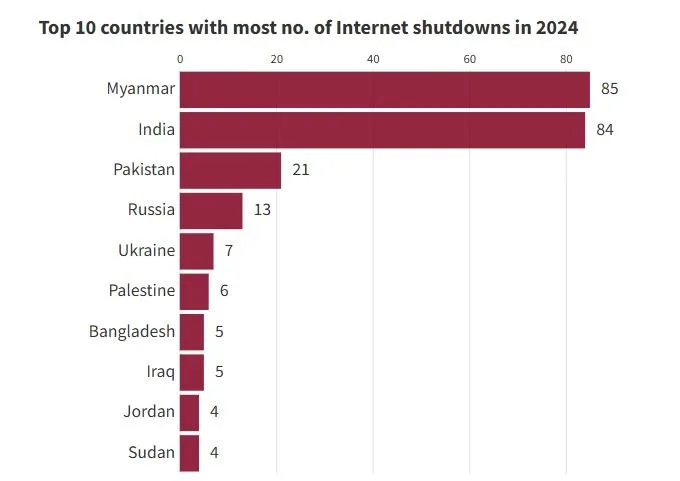Syllabus: GS2/Polity and Governance
Context
- According to a report by advocacy body ‘Access Now’, the number of Internet shutdowns are highest in 2024 globally.
About
- Global trend: 296 Internet shutdowns happened globally in 2024, and India’s cumulative 84 curbs accounted for 28% of these.
- India had the second highest number of Internet shutdowns in 2024; Myanmar had one more disruption than India.
- India’s total shutdowns in 2024 were fewer compared to the previous year.
- Shutdowns affected 16 States and Union Territories in India.
- Most Shutdowns: Manipur (21 shutdowns), Haryana (12), and Jammu & Kashmir (12).
- Reasons for shutdowns: 41 related to protests, 23 due to communal violence.

Legal Provisions Relating to Internet Shutdown
- Grounds: Indian States and Union Territories can impose an internet shutdown only in case of a “public emergency” or in the interest of “public safety”, according to the Indian Telegraph Act.
- However, the law does not define what qualifies as an emergency or safety issue.
- Till the year 2017, shutdowns were imposed largely under Section 144 of the Code of Criminal Procedure (CrPC).
- Section 144 of CrPC gave the police and the District Magistrate the powers in order to prevent unlawful gathering of people and also to direct any person to abstain from a certain activity.
- In 2017, the law was amended and the Government promulgated the Temporary Suspension of Telecom Services (Public Emergency or Public Safety) Rule 2017.
- These rules outline the procedures and conditions under which internet services can be temporarily suspended.
- They require the review of orders by an advisory board within 5 days to ensure the legitimacy of the shutdown.
| Anuradha Bhasin v. Union of India Case: – In 2020 the Supreme Court by ruling on Jammu and Kashmir Internet shutdown held that indefinite internet shutdowns by the State is not permissible under Indian Constitution. – The apex Court further stated that imposition of Section144 can not be used as a mechanism to avoid genuine protest which is permitted under the Constitution. 1. Section 144 has very specific parameters, only if those parameters are satisfied then only a Magistrate can pass the orders. Key Highlights of the orders: 1. Usage of the Internet is the Fundamental Right under Article 19 of the Indian Constitution. 2. Internet shutdowns can be of temporary period but not for indefinite period. 3. Government to publish all orders imposing restrictions under Section 144. 4. The Court had also said that any order with regard to Internet Shutdowns will come under Judicial Scrutiny. |
Arguments in Favour of Internet Shutdown by the Government
- National Security: The government suspend internet services as a temporary and targeted measure to prevent the spread of misinformation, coordinate unlawful activities, or address security threats.
- Temporary and Targeted Measures: These measures are not meant to infringe on long-term access but rather to address specific and immediate concerns.
- Preventing Unrest and Violence: Suspending online communication helps prevent the organization of protests, riots, or other forms of civil unrest.
- Counteracting Fake News and Disinformation: During times of crisis or conflict, false information circulating online can exacerbate tensions and contribute to misinformation.
Arguments Against the Internet Shutdown by the Government
- Impact on Freedom of Expression: Internet shutdowns infringe upon the freedom of expression guaranteed by the Indian Constitution.
- Global Image and Investment: Frequent internet shutdowns impact India’s global image, raising concerns among investors and international partners.
- Human Rights Concerns: Internet shutdowns raise human rights concerns, including the right to access information, freedom of speech, and the right to peaceful assembly.
- Economic Disruptions: India has a rapidly growing digital economy, and internet shutdowns can lead to significant economic losses.
- Educational Challenges: With the increasing use of online platforms for education, internet shutdowns severely affect students’ access to learning resources.
- Lack of Transparency: The government needs to provide clear justifications for such actions and communicate transparently about the duration and reasons for the shutdown.
Conclusion
- In a democracy, governments need to provide a rationale for disrupting the internet services in a periodic manner.
- Indiscriminate shutdowns have high social and economic costs and are often ineffective.
- For better internet governance the Indian civil society needs to push for a transparent and accountable system.
Source: TH
Previous article
International Mother Language Day
Next article
India’s Rising LNG Imports